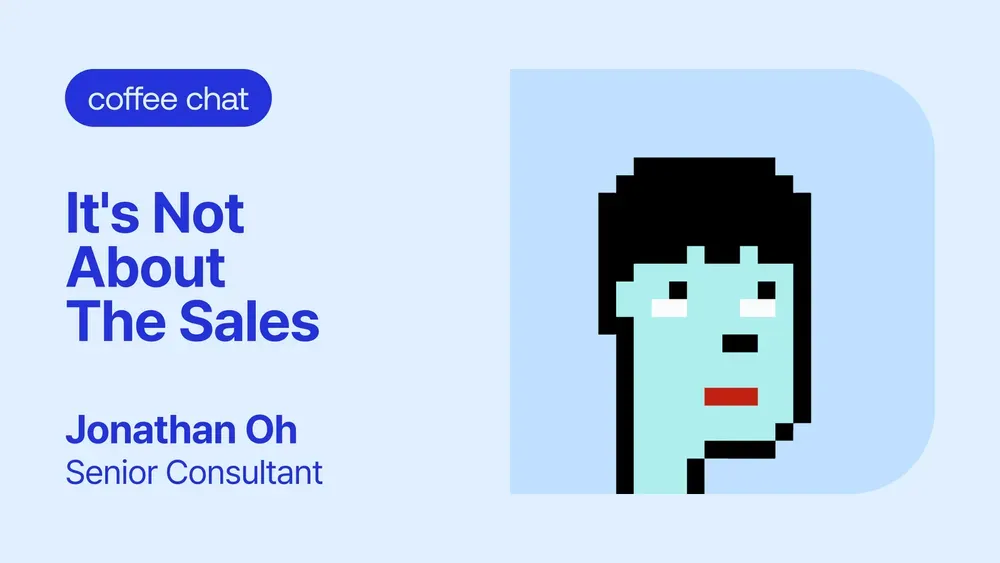
A Coffee Chat With D's Friends I Jonathan Oh / Senior Consultant
In this episode, we met Senior Consultant Jonathan Oh to discuss the overall narrative of Web3 marketing. Jonathan mentioned that he became interested in DeSpread in the past due to his curiosity about Stacks.

"It's Not About The Sales"
**Disclaimer) The opinions expressed in this interview are those of the interviewer and do not represent the official statement of DeSpread.
Hello, I’m Eunji Cho at DeSpread. DeSpread is a company of “Degens” who are immersed in the Web 3 industry. Each of our team members has a unique personality, but we share the same DNA: a genuine love for Web 3. We work in a free-spirited atmosphere, but we’re all professionals in our respective fields.
Last time, we interviewed Andy Park, Global BD for our 11th Coffee Chat with D’s Friends. In this episode, we met Senior Consultant Jonathan Oh to discuss the overall narrative of Web3 marketing.
Jonathan mentioned that he became interested in DeSpread in the past due to his curiosity about Stacks. Before joining, he encountered DeSpread’s Stacks content as a Stacks holder (investor) and felt drawn to DeSpread’s charm. Utilizing the strengths he experienced during that time, he is now actively contributing in DeSpread’s marketing department.

Eunji: Could you please introduce yourself?
“Hello. I’m Jonathan Oh, Senior Consultant at Despread.”
Eunji: I’m curious about the reason you got into Web 3 industry.
“In 2016, I encountered cryptocurrency for the first time. I was friends with Taekyu, who is now an executive at DeSpread, and he explained Bitcoin to me. After getting introduced to Bitcoin, I decided to read its whitepaper, which sparked my interest. It was a time when the ecosystems of individual projects were not properly formed, yet I was deeply impressed by the formation of communities around each project and their willingness to try new things in that environment.
That’s when I started investing in cryptocurrency. I began by reading the whitepapers of projects and analyzing their goals to determine whether to invest. This approach was very different from the usual method of trading based on charts. Although I wanted to delve deeper into the rapidly changing Web3 market, I couldn’t follow up due to being busy with my current job. As this situation persisted, the disconnect grew. Eventually, I resolved to pursue what I wanted to do and entered the Web3 space."
Eunji: What did you do before joining DeSpread?
“I studied life sciences at KAIST graduate school. During my undergraduate years, I developed a keen interest in life sciences while studying it as a textbook subject. Subsequently, I pursued graduate studies in a laboratory conducting research on epigenetics. In graduate school, I delved into understanding the chemical and molecular mechanisms at work in our bodies beyond the DNA base sequence. Specifically, I researched the mechanism of how DNA is transcribed into RNA. It's an entirely different field from blockchain!”
Eunji: What did you do before joining DeSpread?
“I got to know DeSpread through a project called Stacks. At the time, I was very interested in Stacks, and DeSpread adopted an approach of building Stacks’ presence in Korea from the early stages and leading the team from a community perspective.
For example, DeSpread was responsible for organizing and sharing information that community members might be curious about through blogs or Medium. Since I was part of the Stacks community at the time, I felt the idea of leading the team from a community standpoint, and this aspect was the most attractive to me.
Next, I thought that my aspirations aligned well with DeSpread.
I enjoy the concept of ‘freedom and responsibility’ given to individuals in life. That's why I found my university life so enjoyable. In university, you have to study hard on your own to achieve high grades and secure a good job. You not only study but also manage your time for various activities, and you are responsible for that.
However, when you enter a typical company, there are constraints on these things. My graduate school experience was similar. But DeSpread appealed to me because it provides individuals with the freedom to do what they want and fosters a culture where responsibility follows. Additionally, the constant support for self-branding was also a significant attraction.”
Eunji: What do you do at DeSpread?
“I am responsible for marketing at DeSpread. As a member of the marketing department, I work to bridge the gap between the project and the community. For example, I play a role in reformatting and simplifying technical aspects and latest updates of the project that the public or community members perceive. Additionally, I also perform SEO (Search Engine Optimization) tasks to ensure that the content created is easily accessible to everyone and gets prioritized for higher visibility on search engine results pages when searched through portal sites.”

Eunji: Could you please introduce the marketing team of DeSpread?
“We play a role in ensuring that the message intended for the Korean community by overseas projects is effectively onboarded. To do so, it’s essential to understand the community’s needs and conduct marketing accordingly. Understanding the latest trends is fundamental. Rather than simply marketing the project to the community, we provide consultancy on the optimal direction for the project to move forward in the current situation.”
Eunji: What are the differences between marketing in the Web3 industry and traditional industry sectors?
“In broad terms, there aren’t significant differences, but each has different objectives. Traditional industry marketing often aims to promote to customers and lead to purchases. However, Web3 marketing doesn't aim to sell cryptocurrencies or NFTs.
Web3 marketing aims to inform the community about the project’s goals and receive feedback to reach those goals successfully. If it were merely about selling a product once, deep understanding wouldn’t be necessary. However, in the Web3 industry, projects must maintain alignment with their goals and the community’s sustainability. This is a key aspect of maintaining a steady ecosystem for the project.
To achieve this, a deep understanding of the project is paramount. Based on this understanding, communication between the project and the community must occur to find common goals.”
Eunji: What is the importance of community in the Web3 industry?
“The ultimate goal of the blockchain ecosystem is also the ‘community.’ (To speak a bit philosophically,) blockchain is about creating governance and building together. The decentralized values that blockchain aims for are perpetuated through governance votes by community members, and that’s precisely why the community is important.
Blockchain makes it easy for communities to communicate and present their opinions during the governance proposal process, making accessibility convenient. Therefore, project teams and communities can closely collaborate on project development. I think this atmosphere is something that only blockchain can showcase.
Within the blockchain ecosystem, communities are crucial, and projects must be able to understand the needs of the community. Additionally, projects need to deliver results that satisfy the community.”
Eunji: So what’s the most important thing about Web3 marketing?
“The most important thing is how much you understand the project you’re working on. To elaborate a little bit, it’s having a broader understanding of the blockchain ecosystem, technical understanding, etc.
As I’ve said before, your first priority should be the project’s community. It's important to consider all community members as participants in the governance and to have a win-win relationship with them. A healthy community builds a healthy building, and a sustainable project is a sustainable project.”
Eunji: Tell us about the SEO you're responsible for in your marketing department!
“In Web3 marketing, SEO work is crucial. Even if community members feel interested in a project through various channels, obtaining information about it is not as easy as it seems. In such situations, SEO work to optimize search results becomes essential.
Because the latest information about projects is scattered, keeping up with updates can be challenging. Even reading whitepapers or docs can feel difficult, leading to a loss of interest quickly. Therefore, it’s important that community members or those interested in a project can easily access information about it when searching on portal sites. For this to happen, the content needs to be prominently displayed and easy to understand within the site.”

Eunji: You mentioned that you also do content marketing and Web3 education. What is the reason for the necessity of these things in the Web3 industry?
“In the end, it’s necessary to reduce the perceived technical barriers to blockchain among the general public. As I mentioned earlier, the technological advancement of blockchain is progressing day by day. However, there still seems to be a vague fear among the public due to information gaps.
For example, the trading volume of centralized cryptocurrency exchanges (CEX) in Korea is significantly higher compared to other countries. However, on-chain activities originating in Korea are low. I believe this is because domestic individual investors simply view blockchain as merely an investment target.
Of course, there's nothing wrong with pursuing price differentials. However, I regret that blockchain is seen only as an investment target, excluding the possibility of addressing various limitations and concerns that blockchain initially presented and its potential to evolve into a promising industry of the future.
I think the reason for this situation is that existing materials are written too complicatedly. If they were initially explained in a simpler manner, the public might take an interest and then evaluate the growth potential of projects after studying them.
If someone acts as a bridge and provides information, I believe both the public and projects will form a healthy ecosystem. In such an environment, blockchain would not just be used as a speculative trading tool based on charts but would be understood for the value of projects.
Therefore, I am preparing various Web3 content and educational courses to make blockchain easily accessible and understandable to the public and to garner more interest.”
Eunji: Why do you think global Web3 companies are choosing DeSpread to enter Korean market?
“I find it very appealing that DeSpread has been instrumental in facilitating the onboarding of projects like Solana and Stacks in Korea from start to finish. Indeed, these projects have successfully established themselves in the domestic market.
Moreover, DeSpread has been communicating with the community based on the data accumulated over years of consulting, allowing them to understand the community's needs and resulting in a continuous stream of success stories.
Furthermore, their consistent synchronization with projects from the outset seems to be positively perceived in the industry.”
Eunji: Do you have any personal goals or goals you want to achieve at DeSpread this year?
“I would like to express hope for the blockchain industry rather than personal goals. I hope that in the future, there will be an environment where more people can create a lot of value by actually utilizing blockchain.
There are many ways to create value with blockchain. For example, with DeFi, you can easily move assets through on-chain transactions without time constraints. Especially during late hours, you can analyze high-yield products and move assets.
With on-chain transactions, there is no need to cross borders; only an internet connection is required, and there is no need for complex processes at a low cost. It’s disappointing that such technology is only used in places where cryptocurrency investments are made. I hope that many people will not only invest but also create value through on-chain transactions.”

DeSpread’s Mission
DeSpread provides refined perspective for web 3 pioneers.